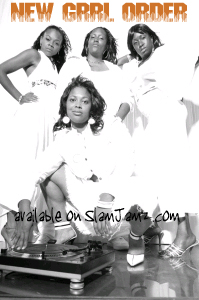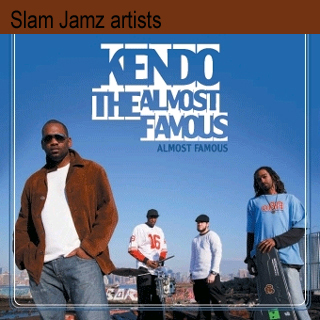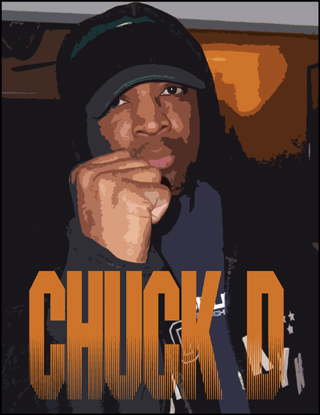This article is about Chuck D, but first bear with my Op-Ed commentary for a moment.
These days I don’t think there would be an argument as to the birthplace of Hip Hop music being The Bronx. There was a time however when I had to debate its origins with people on a regular basis. Some people felt that I was biased since I was born and raised there and spent most of my childhood in the Bronx River sector of the borough during the ‘70s and ‘80s. The irony is that since the airing of certain specials and programs on VH1, I don’t have to argue Hip Hop’s birthplace any longer. Apparently Viacom is a much more reliable source of this culture than a Puerto Rican kid who grew up arm in arm with Hip Hop as his sibling. Oh well, that’s the power of major media.
Today, among other things, I spend time debating with younger people about who are the most influential Hip Hop artists/groups of all time. I hear a variety of names, but it seems that learning the history of this culture isn’t a priority of many young fans. Sure, they’ve heard of the golden era artists and the forefathers of Hip Hop, for the most part ala VH1. Many of them have never heard the actual songs and albums other than a few standards that for the most part are played on mixes or are sampled. Regardless of what anyone says, my top two most important Hip Hop groups of all time are Run DMC and Public Enemy. This isn’t to take anything away from classic groups such as Cold Crush and The Furious Five, those are without a doubt staples and the foundation of Hip Hop, but my top two choices, I feel changed the landscape of this genre from what was once called a passing fad known as “rap music,” and today is a billion dollar industry called “Hip Hop.” Those terms themselves are very ironic, but I guess that’s another discussion better left for another day.
Back to Run DMC and PE: Run DMC truly brought the genre to an international audience like no other group before them. In fact, they were the first, acknowledged rap superstars. Public Enemy were also international music stars, but more importantly, they gave Hip Hop music a purpose. Run DMC were no doubt positive influences, but PE provided a platform. Their powerful lyrics and political messages lead a revolution that incited and excited people of all races. Front man Chuck D’s one of a kind vocals demanded that people to take notice, and people from all walks of life did so. Over two decades later Chuck D is still an innovator whose voice commandeers attention. Those with keen eyes and ears are still focused on the man in the crosshairs whose immortal words, “the rhythm the rebel…” echoes through the headphones and speakers of every true Hip Hop fan that ever hit a play button.
Today Chuck D has just embarked on his 57th world tour with his comrades the S1Ws, DJ Johnny Juice, and of course Flava Flav- who in recent years has turned into a reality TV celebrity- thanks to VH1 shows such as The Surreal Life, Strange Love, and Flavor of Love. 20 years in Hip Hop is far from a small feat, the number of artists in general who have sustained a two decade career is a short list, never mind those from within the fickle world of Hip Hop. The question is- how relevant is Public Enemy today? Well, if the content of their most recent studio albums, “Rebirth of a Nation” (2006 Guerilla Funk Records) and “New Whirl Odor” (2005 Slam Jamz), is an indicator, then PE is as relevant now as they were in 1986- in some ways even more so. How can this be? Well in the ‘80’s it was very difficult to find Hip Hop music that was far off the track of its roots and original essence- originality, positivity, and creativity. Music during that era, for the most part, was an uplifting force for kids of the inner city; giving them an alternative to the blight that was surrounding them daily. Today, the namesake that was created to help youths focus on something positive is now a force for negativity, misogyny, violence, drug abuse, materialism, and an instigator of stereotypes about minorities.
Today, the man known for brining societal injustice and the corruption of politics to the forefront of rap music is doing more than ever. Besides the fact that he’s still bringing the noise with Public Enemy, he also is continuing his mission to be an innovator in delivering music directly to the fans with his Slam Jamz label. He first started this mission during the later ‘90s when he offered the PE album “Bring the Noise 2000” to fans on MP3 against the wishes of PolyGram, the band’s label at the time.
 Slam Jamz has been operating for a decade and is still going strong. The label’s CD releases all have the added value of containing bonus DVDs featuring band videos, documentaries and other content. Slam Jamz also features digital only releases and also administers publishing for some of the signed artists. Chuck determines the acts that Slam Jamz will sign based on their regional viability more than their national appeal. This is because he understands that an independent label’s biggest strength is embracing their artists’ backyard. Artists are encouraged to make appearances in schools, local venues, and fundraisers, et cetera. This will allow them to build relationships and become strong members of their neighborhoods, hence growing their fan base on a level that makes sense to a small independent label. This regional brand building also brings the community back into Hip Hop, which goes full circle to what made the genre such an important force in the first place. The same can be said for radio. Chuck, who has a show on Air America on XM Satellite radio, and is also the founder of the online media site Rapstation.com, feels that the loss of community in the radio market is what has lead to the lack of public interest in terrestrial radio as an innovative medium.
Slam Jamz has been operating for a decade and is still going strong. The label’s CD releases all have the added value of containing bonus DVDs featuring band videos, documentaries and other content. Slam Jamz also features digital only releases and also administers publishing for some of the signed artists. Chuck determines the acts that Slam Jamz will sign based on their regional viability more than their national appeal. This is because he understands that an independent label’s biggest strength is embracing their artists’ backyard. Artists are encouraged to make appearances in schools, local venues, and fundraisers, et cetera. This will allow them to build relationships and become strong members of their neighborhoods, hence growing their fan base on a level that makes sense to a small independent label. This regional brand building also brings the community back into Hip Hop, which goes full circle to what made the genre such an important force in the first place. The same can be said for radio. Chuck, who has a show on Air America on XM Satellite radio, and is also the founder of the online media site Rapstation.com, feels that the loss of community in the radio market is what has lead to the lack of public interest in terrestrial radio as an innovative medium.
When asked if traditional radio was dead his response was, “it’s not dead, but it’s whimpering. As far as music is concerned…the minute that all radio stations think that they can be national and broadcast from a national standpoint, and program from a national standpoint, looking for national money… it will continue to die. Radio was on its way out when TV came in. The only thing that saved radio is the fact that they realized that it can actually build a locale and adhere to local sponsors…What’s going to make a person driving in Kansas City and Omaha listen to radio in the first place? It’s got to communicate what’s around their way and navigate their whole surroundings. You also had local acts that would get on the radio from independent companies that were promoting in that area, which were able to build and synergize local businesses…That disappeared with the buying-out of radio stations…the Clear Channeling… You always had support for local artists, if radio doesn’t do that locally…it’s out of here.”
whimpering. As far as music is concerned…the minute that all radio stations think that they can be national and broadcast from a national standpoint, and program from a national standpoint, looking for national money… it will continue to die. Radio was on its way out when TV came in. The only thing that saved radio is the fact that they realized that it can actually build a locale and adhere to local sponsors…What’s going to make a person driving in Kansas City and Omaha listen to radio in the first place? It’s got to communicate what’s around their way and navigate their whole surroundings. You also had local acts that would get on the radio from independent companies that were promoting in that area, which were able to build and synergize local businesses…That disappeared with the buying-out of radio stations…the Clear Channeling… You always had support for local artists, if radio doesn’t do that locally…it’s out of here.”
Today the front man for one of Hip Hop’s most potent groups, and in many ways the voice of a generation, is as vital as ever to the preservation of a culture that even those who seem to evangelize it don’t really understand. And what’s so hard to understand anyway? Hip Hop was born out of frustration, desperation, and inner city blight. Its purpose was to rebel against society’s ills while delivering inner city youths from society’s evils. These powerful, enlightening, and positive messages can still be heard in PE’s past and current music. So when you’re watching BET, or listening to that homogenized local urban radio station, remember, don’t believe the hype, raise the roof, fight the power, and stand for something! by IZ-REAL
visit SlamJamz.com




